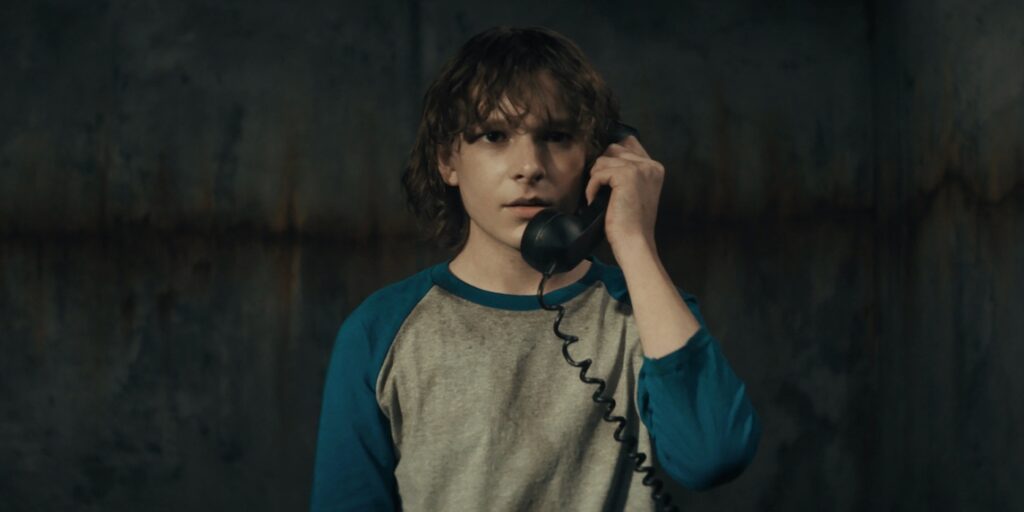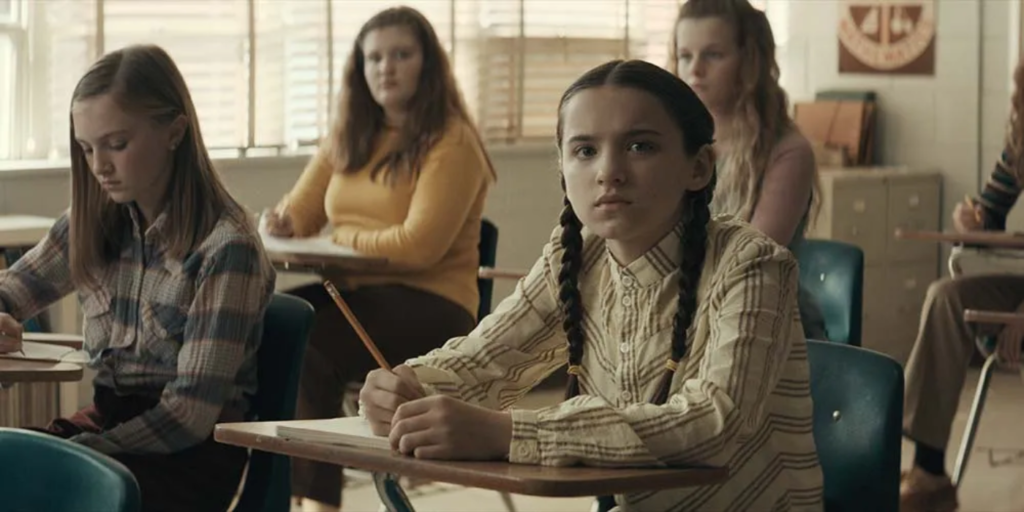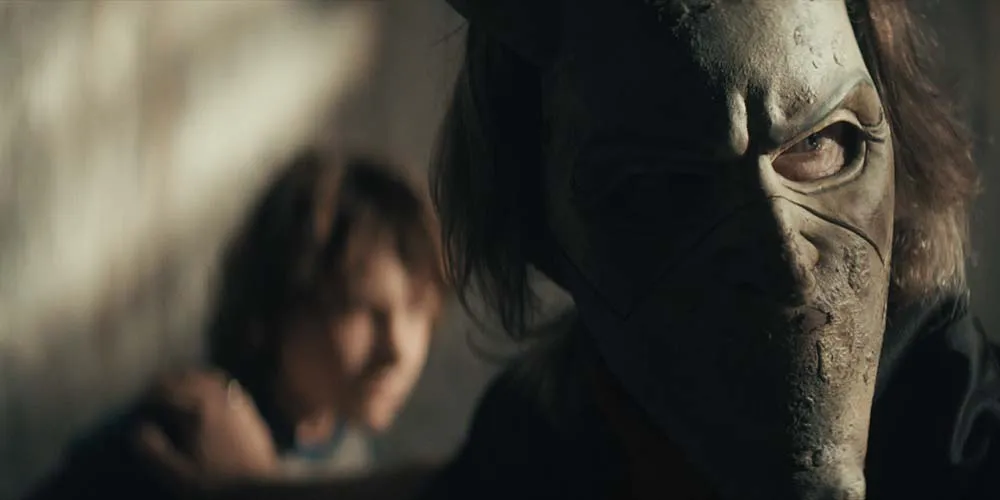The Black Phone received a mainstream release in 2022 to a mixed reception. It was praised for it’s cinematography and the performance of Ethan Hawke, but some found the plot holes to be too big to ignore and the whole piece to be unsatisfactory. However, it has fast become one of my favourite horror releases of the 21st century and despite a seeming ambiguity, I think there is a lot to uncover within the implicit details.
The best way to look through the film is to unpack the various elements and outline how I felt they added to the overall package of the film, of course this will require details of the plot so:
*Spoilers Ahead*
It’s worth mentioning my initial feelings as to why this film ticked so many boxes for me. I was apprehensive because I was not a huge fan of Sinister, but as I alluded to earlier, I really loved The Black Phone and there is one key reason why. The film is based on a short story by Joe Hill, the son of Stephen King, and parallels to his father’s work were abundant. From the subtle inclusion of the supernatural to the collaboration of a group of kids to overcome a bigger evil, you wouldn’t be mocked for thinking the inspiration for this was an original idea from King, one of the characters even wears a yellow raincoat for an extended period of the feature. This, I believe, is what helped The Black Phone resonate with me, I love Stephen King tropes and it is full of them – the hazy nostalgia allowed for a suspension of disbelief. Yes, Finney would probably not be able to overcome The Grabber, or dig through the floor without The Grabber noticing but hey, it is also unlikely that a disconnected phone would allow for communication with the dead. But give me a character discovering their own strength in the late 70s and I’m sold.
Finney’s Character Development is a Highlight

So, why didn’t Finney just kill the Grabber when he tried to escape the first time if he could overpower him all along. I must admit, when Finney walked up the stairs and a shirtless Ethan Hawke was passed out on a chair, I was screaming at him to grab a knife and end The Grabber there and then. That could not have happened. At the start of the film, Finney could not defend himself at all, he relied on Robin’s presence, and once Robin disappeared, he was basically defenceless. With each phone call in the basement, Finney gained something, either a physical object (such as the cable) or information (such as the combination lock). Throughout the film, we know at some point Finney is going to speak to Robin and when he goes upstairs to escape initially, this conversation has not yet happened. When it does eventually occur, this final conversation is different, Robin does not give Finney either of the aforementioned things, instead, he gives him confidence to stand up for himself and that is how he overcomes The Grabber. The crux of the success of The Black Phone is Finney’s character development, everything has to happen how it does for this character arc to work.
We hear Bruce (the first boy to call) tell Finney that he’s “glad it’s him”, and we learn that Finney is the only one who can hear the phone calls. Look at the other boys who have been kidnapped, and it is Finney that overcomes The Grabber, some might say unrealistic, but I think it implores an important message of finding inner strength as well as the importance of all these boys working together. The Finney we see stood outside The Grabber’s house at the end of the film is a completely new man to the one we meet who is powerless at the start of the film, and it is this character growth that made The Black Phone feel both satisfactory and impactful.
Sibling Dynamics are Central to The Black Phone

Although Finney is the protagonist, the supporting cast play an important role. Yes, Finney could’ve have escaped without interference, in fact that’s exactly what he did but I think Gwen offered more than simply being a misdirection as to how the situation was going to be resolved. Madeline McGraw puts in the standout performance of the film and her acting alone makes this character a worthwhile addition. We learn Gwen has dreams about The Grabber, something she seemingly inherited from her mother, and we learn that these dreams partnered with her mother’s suicide acts as the reason behind her father’s abuse towards her. Through this, Gwen and Finney are extremely close and the bond between them runs as an important narrative. However, I think what is most interesting about this closeness throughout abuse is implicitly paralleled by The Grabber. We are unsure about The Grabber’s past (something I will mention later) but I think it could be interpreted that he was abused as a child, and/or his brother was. He refers to his brother as ‘my idiot’ and although it is a split second, it does feel like there is a sense of protection there. Similarly, we see his brother is reliant on substances in some way which almost acts as a counter to how The Grabber may be dealing with childhood trauma. Although it is not confirmed, this potential backstory allows The Grabber and his brother to act as a contrast to the relationship of Gwen and Finney and how abuse can differently affect people.
The Grabber is a Purposefully Ambigous Villain

There are certainly questions around The Grabber, both his motives and actions are ambiguous. The film is already rated a 15 for other elements, yet a lot of the scenes in the basement, particularly with victims prior to Finney are not shown. This means, the true intentions of The Grabber are left unclear, however even the implication of potential assault is scary enough and I don’t think the film needed to show those scenes. Sometimes not knowing is scarier and allows more what ifs to circle, for the film to show anything more would actually have taken away from the final product. Of course, the narrative of ‘naughty boy’ and the rules of the game offer implications of assault but the film purposeful doesn’t make it obvious or tell you exactly what happens, and it doesn’t need to – to say it does I think would change the whole tone of the piece.
For me, the most interesting narrative aspect of The Black Phone is the use of The Grabber’s mask. Made up of different components, the flexibility of the mask allows an otherwise emotionless object to reflect how The Grabber is feeling and therefore how he is going to interact with Finney. However, the pinnacle of this is during the film’s climax when Finney removes this mask, and it is at this point The Grabber loses his power. I also feel this symbolises a separation between the persona of The Grabber and the powerless boy who was a potential victim of abuse, which acts as a possible motive for his actions and an explanation as to how he chooses his victims.
Considering his screen time was minimal, The Grabber was a creepy and intriguing antagonist, that Ethan Hawke committed to. I think the questions that surrounding him add to the uncertainty his victims are feeling and the infamy that surround such killers. Everyone knows about The Grabber, but no-one actually knows about him, and that is replicated in the viewer’s experience. We are in the dark and can only speculate as if we are trapped with Finney. Even at the conclusion, when The Grabber is dead, the town will still ask questions as to why he took 5 innocent lives, there will be no closure as is reflected in real-life crime cases. As a complete story, The Black Phone left questions, and the more you ponder it, the more you come up with your own answers to those questions, but you will never know the whole truth. The Black Phone was a high point of 2022’s horror offerings, and I hope it stays as a self-contained story for me to go back to again and again.
